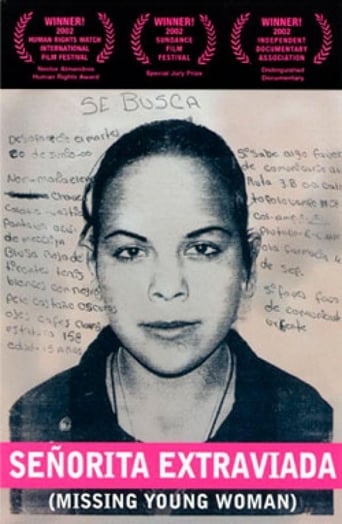

This is an excellent, out standing, brilliant documentary about the corruption and dereliction in the mexican police forces against criminals....i cant recommend this movie enough, please go rent it!!! It will make you FEEL the pain of the victims and families....5 out fo 5 stars
... View MoreOne of the films featured in the most recent Human Rights Watch annual film festival, this is a somber, understated, yet relentlessly compelling documentary about the hundreds of unsolved murders of women that have occurred over the past 10 years in Cuidad Juarez, the Mexican border city across the Rio Grande from El Paso. Portillo, a veteran documentarist from Mexico who focuses her work on women, interviews surviving relatives and a woman who was raped by police and later shown photos of their apparent involvement in ritual sadistic sexual group rape-killings of women. Portillo also presents the chronology of the wave of murders, beginning in 1993, including televised comments by several government officials, an account of various suspects arrested and detained, and segments of an interview with a federally appointed criminal justice official heading a task force to seek suspects. She mixes this material effectively with footage of the streets of Juarez and still photos of a number of the deceased victims. It is known that many of the victims were young poor women who came to Juarez to work in the maquilladora factories. Detention of multiple suspects has not stopped the killings. Since the film was completed these crimes have continued and apparently no new arrests have been made. Several confessions have occurred but some of these are strongly rumored to have been made under torture. For the first time, just this year, an official federal count of the number of killings has been announced: 258, including 20 or more since 2001. What Portillo does not make clear is that roughly 90 of the killing fit the profile of young dark skinned girls who were raped and then killed. The rest -a majority - did not involve rape and the victims, all women, were of more varied characteristics. Suggested links of the crimes have been made to drug traffickers, human organ smugglers and sadistic cultists. Portillo strongly implies that high level government officials are duplicitous in the problem. This certainly seems likely in view of the fact that sites where bodies were found and other evidence was contaminated or discarded in virtually all cases, making reasonable forensic analysis impossible (you think they'd get it right after the first hundred or so); there has been no serious, sustained effort at any level to upgrade the sophistication of investigations; and local police implicated in some of the crimes have not been indicted to date. Although an American sexual criminal profiler suggested several years ago that someone from the U.S. could be a perpetrator of at least some of these crimes, there has been no followup on that idea. What about a motive? Border towns thrive on illicit activities that make money. The sheer volume of these cases, their steady occurrence over 10 years, the macabre nature of some of the killings - i.e., peculiar mutilations of the bodies, the implied connections to organized crime, and the confinement of the murders to a border city, makes one wonder about the possibility that some of these cases might represent an extreme form of "sex tourism": a business in which wealthy sexual sadists from the U.S. or elsewhere might be entering Juarez and paying high fees to witness or take part in group rape/murders. In Los Angeles, later this autumn, Amnesty International and the UCLA Mexican Studies Program will co-host an international conference on this unending wave of unsolved murders of women in Juarez. This film will be shown.
... View More